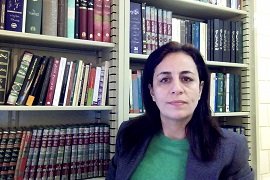Maryam Moazzen
Assistant Professor, Department of Comparative Humanities and Middle East & Islamic Studies Programs

“We should remember that education is not just a pursuit that one uses to get started in a career; education first and foremost should be regarded as a driving force that continues to form and invigorate our life. Let’s not forget that countless college students who graduated with degrees in humanities and social sciences hold successful careers in politics, medicine, creative professions, law, media, education, business and international relations, the arts, public service, and so forth.”
There was a time when education was justified solely on the basis of personal exploration and fulfillment. These days, however, education is increasingly regarded as the principal determinant of earning power. In this competitive economic environment, science, technology, engineering, and mathematics (STEM) fields are seen as far more valuable than the humanities. A liberal arts education is depicted as learning without an obvious “end career goal” and as an example of a “wasted” education without immediate monetary value.
With the job market continually shrinking, many concerned parents want their children’s education to provide an immediate financial reward and college students themselves often feel compelled to take a straight and narrow path that they believe will land them a financially rewarding career.
Unhappy with the ever-expanding cost of higher education, staggering student loan debt, and a lack of skilled workers in science and technology, a growing number of elected officials including our own governor seek to privilege fields that they believe will lead to economic growth. In this scenario, a liberal arts education is cast as “frivolous” and thus hardly worthy of state funding. As concerned politicians, they can expect us – the educators – to fully inform students of the prospects of their choice in majors, but deciding to penalize certain majors based on the future salary expectations in the form of reduced funding is essentially ill-informed and not borne out by reality. In effect, the trend of reducing funding for the liberal arts and providing more incentives for STEM majors at public institutions would make liberal arts education, with its substantive critical, cultural and creative outcomes, increasingly limited to those who can afford to attend expensive private institutions. This in itself is wrong-headed.
While STEM majors are very valuable to our society and economy, we should keep in mind that a liberal arts education enhances students’ ability to analyze information effectively, to synthesize different perspectives, and to think critically. A liberal arts education also helps students to become more informed global citizens possessing a broad skill set with which to approach and solve problems, and the ability to better discern opportunities. More importantly a liberal arts education provides students ample resources to build a more humane society through a deeper cultural understanding and ethical reasoning.
We should remember that education is not just a pursuit that one uses to get started in a career; education first and foremost should be regarded as a driving force that continues to form and invigorate our life. Let’s not forget that countless college students who graduated with degrees in humanities and social sciences hold successful careers in politics, medicine, creative professions, law, media, education, business and international relations, the arts, public service, and so forth.
